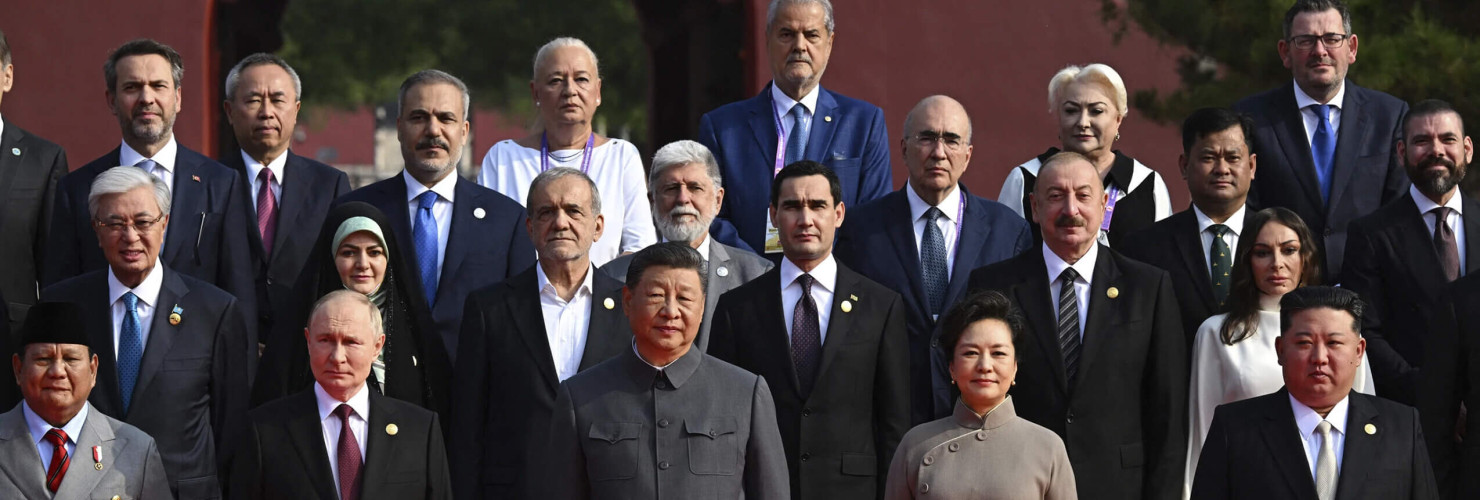

Beijing showcases its global order pitch
Chinese President Xi Jinping used the recent gathering of over 25 heads of governments in Beijing to launch a new phase of China’s efforts to change the world order. European states should take note.
In early September, Beijing prominently displayed its vision for an alternative global order and governance system. While the world geared up for this year’s United Nations General Assembly, which will mark the 80th anniversary of the UN, China hosted over 25 world leaders for the Shanghai Cooperation Organization (SCO) Plus summit and a high-profile military parade commemorating the 80th anniversary of the end of World War II.
These events provided Beijing with a perfect opportunity for a show of military and geopolitical force. Flanked by Russian President Vladimir Putin and North Korean dictator Kim Jong-un, China’s party and state chief Xi Jinping presided over a showcase of China’s new military capabilities and also displayed China’s role as a leader of the Global South and the anchor of an anti-Western coalition.
It is no coincidence that Beijing chose to launch its latest global initiative at this time. As the United States continues to retreat from its traditional global leadership role and the Western alliance fractures, the post-1945 global order is increasingly under strain. Beijing finds itself with a perfect opportunity to present itself as a paragon of stability, a responsible global power, and a defender of multilateralism, and to push for the reform of the current order that it has been angling for.
In fact, the Global Governance Initiative (GGI) is one of Beijing’s most structured efforts to date to articulate China’s vision for the reform of the international system. It is likely to mark a more ambitious phase in China’s engagement with the countries of the Global South as it works to challenge the Western-led order.
Global governance with Chinese characteristics
Beijing presented the GGI as China’s proposed solution to the ills affecting the current global order. Continuous reforms are required so that global governance—with the UN as its core—can keep up with changing global dynamics, the narrative goes. But “unilateralism and hegemonic practices” (read: Western nations’ wish to preserve their own dominance over the global order) stand in the way of this process. The GGI proposes a path for reform designed to create a “community with a shared future for humanity.”
China’s proposed way forward largely repackages existing Chinese rhetoric. It is built on five principles that will be familiar to close watchers of China’s foreign policy discourses: sovereign equality, international rule of law, multilateralism, a people-centered approach, and real results. These are all concepts that, on the surface, echo core elements of the UN Charter and that tend to resonate among many audiences, especially (but not exclusively) in the Global South.
The main deficiencies that Beijing ascribes to the current global order and multilateral institutions do, after all, reflect real concerns of many developing nations. The underrepresentation of the Global South in international organizations, or the ineffectiveness of the UN in driving progress on global challenges like climate change or inequality are complaints shared by much of the world. By echoing these concerns, Beijing is trying to establish itself as the standard bearer for a dissatisfied Global South and as a stable actor within an increasingly fragmented international system.
The Chinese leadership’s definition of many of these terms, however, differs from European or liberal democracies’ interpretation. Xi Jinping’s vision of multilateralism, for instance, is based on opposition to universally binding rules and a preference for bilateral consultations. The Chinese Communist Party’s focus on sovereign equality similarly defends the idea that all state’s political systems should be equally respected, and that national interests should take precedence over any international commitments.
With the GGI, Beijing is attempting to use widely-accepted terms to criticize the current liberal order, expand China’s global influence at the expense of Western countries, and position itself as the leader of a reform that will create a fairer global governance system. For Beijing, this would mark a huge milestone in its path toward becoming a global power. For the EU, the United States, and other Western countries, China’s success would entail not just a loss of leadership over global governance, but also a very different world and balance of power.
A new coalition to reform the international system
The GGI, alongside previously launched global initiatives on development, security, and civilization, represent elements of China’s increasingly consolidated proposal for an alternative international system. The current global order is viewed in Beijing as too dominated by Western countries, which use it to preserve their own hegemonic position. Reforming it, and even dismantling or replacing certain elements of it, is seen as a required step to reduce Western countries’ global influence and make the global governance system more aligned with the party-state’s interests, paving the way for a new global role for China.
To get there, China has been trying to garner support across much of the Global South. It has sought to build a competing coalition of countries that either share China’s views on global governance, or are dissatisfied with the current order or with the United States or the EU more specifically, for a variety of reasons.
Chinese narratives emphasize China’s role as a responsible global power and a force for peace, which defends a model based on non-interference, respect, and win-win cooperation, in contrast to Western countries’ interventionism and double standards. With growing doubts about the credibility and effectiveness of the US-led order, this is seen by many as an attractive proposition. Global instability, spurred by uneven Western responses to Russia’s full-scale invasion of Ukraine and to Israel’s war on Gaza, and by the second Trump administration’s imposition of tariffs and disregard for allies, has only created even more fertile ground for Beijing’s narratives.
China’s decision to launch the GGI while so many leaders from across the Global South were in the country for the SCO summit and the military parade was not coincidental. These nations, with Russia as a key pillar, represent China’s hopes for a new power base that will allow it to push back against the Western-dominated global order. By releasing the GGI at the meeting of SCO heads of government, Xi was not only making a case for its approach. He was also signaling that China does not stand alone in its global order reform ambitions. As Xi told Putin in 2023, “right now there are changes—the likes of which we haven't seen in a century—and we are the ones driving these changes together.”
For now, the GGI remains a broad blueprint, designed more to exploit the West’s failures and position China as an alternative, than to provide specific policy solutions. Despite this, the EU should recognize its significance. The initiative might be filled with more specific content and details as it is rolled out. But even if it does not, it is still a clear expression of China’s global ambitions and a sign that the systemic rivalry with China is likely to intensify.
As a consequence, starkly different visions of the global order will be on display at this year’s UN General Assembly, which started on September 22. For the EU, the stakes are high. As Beijing consolidates its pitch for a new global governance system, and promotes its initiatives and concepts through groupings like the SCO or BRICS, European countries should expect the rules, norms, principles, and institutions that make up the post-1945 order to become increasingly fragmented and contested. With Washington seemingly uninterested in standing up for the order it helped create, Europe will have to find a way to work alone—and with other partners—to uphold key aspects of the global order, address global challenges, and defend its own interests.
This article was first published by Internationale Politik Quarterly on September 30, 2025.
